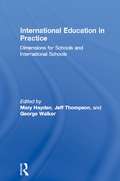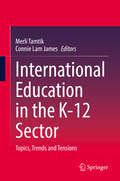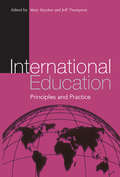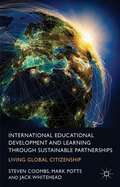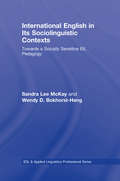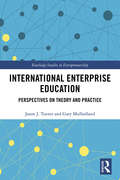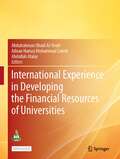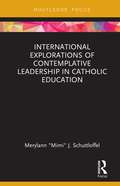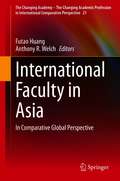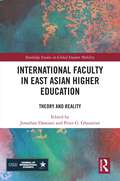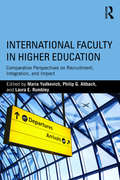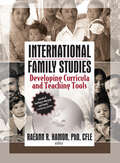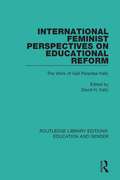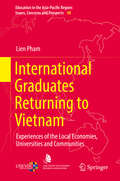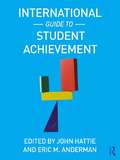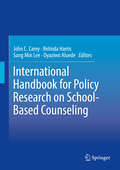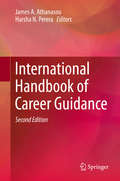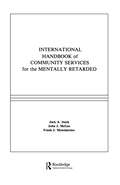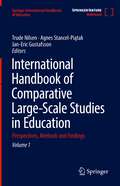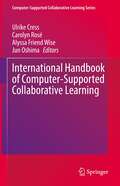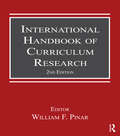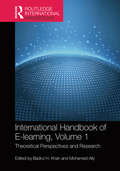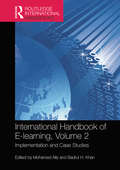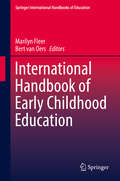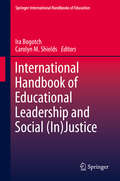- Table View
- List View
International Education in Practice: Dimensions for Schools and International Schools
by Mary Hayden Jeff Thompson George WalkerEdited by three leading figures in the field, this book offers an absolutely authoritative interpretation of international education today. Under the umbrella of groups such as the International Baccalaureate Organization, academic research, increasing student numbers and interest from national school systems, international schools are rapidly developing in terms of curriculum, standards and influence. This book brings together present thinking on all aspects of international education, its management and the best practices. Truly international in scope, this is a book that anyone involved with international education should read.
International Education in the K-12 Sector: Topics, Trends and Tensions
by Merli Tamtik Connie Lam JamesThis edited volume focuses on K-12 international education in a global context and examines trends, emerging topics, and prevalent tensions. It considers the rapidly growing phenomenon across a variety of country contexts in a way that can convey both empirical evidence and insights into theorization and practical debates. Contributors touch upon a range of emerging trends in K-12 international education globally, including student mobility, curriculum design, language learning, methodological considerations, and policy considerations through a holistic and comprehensive approach. The book also applies a critical decolonial lens in examining K-12 international education by inviting readers to think critically about issues of power, privilege, equity, and social justice in trying to foster a more informed and socially responsible approach to international education. Ultimately, the book attempts to move beyond a one-size-fits-all approach in order to embrace the complexity of issues that emerge from international education involving vulnerable populations. The book is grounded in institutional theory, which allows to explore the complex web of institutional norms, values, and behaviors that are shaping the experiences through international education across the different chapters in this volume. As an edited volume, authored by academic experts and practitioners from around the world, this book provides the most recent and up-to-date account on documenting developments related to K-12 international education internationally. Through contributing significant evidence across international contexts, the book raises new questions and offers new perspectives to the field, opening conversations both within and across governments and non-governmental stakeholders such as educators, students and parents.
International Education: Dimensions For Schools And International Schools (Sage Library Of Educational Thought And Practice)
by Mary Hayden Jeff ThompsonA study of the principles and practices of international education. Each chapter of this volume addresses a key issue in international education, seeking to blend practical issues with leading research. This revised edition includes a new introduction by the editors.
International Educational Development and Learning through Sustainable Partnerships
by Jack Whitehead Steven Coombs Mark PottsAddressing the debate around what makes a good citizen, this work proposes a new form of post-colonial citizenship education which can be applied in any cultural setting. International educational partnerships provide the opportunity for participants to live out values such as cultural empathy and thus demonstrate their right to citizenship.
International English in Its Sociolinguistic Contexts: Towards a Socially Sensitive EIL Pedagogy (ESL & Applied Linguistics Professional Series)
by Sandra Lee McKay Wendy D. Bokhorst-HengPresent-day globalization, migration, and the spread of English have resulted in a great diversity of social and educational contexts in which English learning is taking place. A basic assumption of this book is that because English is an international language, effective pedagogical decisions cannot be made without giving special attention to the many varied contexts in which English is taught and learned. Its unique value is the combination of three strands – globalization, sociolinguistics, and English as an international language – in one focused volume specifically designed for language teachers, providing explicit links between sociolinguistic concepts and language pedagogy. International English in Its Sociolinguistic Contexts: fully recognizes the relationship between social context and language teaching describes the social and sociolinguistic factors that affect the teaching and learning of English examines how the social context is influential in determining which languages are promoted in schools and society and how these languages are taught is unique in directly relating basic constructs in sociolinguistics to English language teaching features case studies that illustrate the diversity of English teaching contexts Directed to a wide TESOL and applied linguistics professional readership, this text will be particularly useful and effective for pre-service and in-service professional development in TESOL for K-12 and higher education levels.
International Enterprise Education: Perspectives on Theory and Practice (Routledge Studies in Entrepreneurship)
by Gary Mulholland Jason J. TurnerThe important debate on the growing graduate skills gaps, the value of universities to their business communities, and their role (or lack of ) in building entrepreneurial attributes among graduates is growing internationally. Using case studies from universities across the globe, this edited book seeks to bring together leading authors with knowledge, and/or experience, of the challenges of embedding enterprise education in university and college programmes. The text identifies and presents the current debates around the future role of universities and colleges in providing ‘fit for workplace’ graduates, as well as offering insights into the challenges and practices involved in delivering innovative enterprise education. The approach collates examples of ‘best practices’ from global institutions enabling educators to develop ‘blueprints’ for implementing in their own institutions. This innovative and comprehensive text is designed to be a ‘seminal resource’ for academic stakeholders on enterprise education collating diverse international contributions from enterprising universities and colleges. Drawing on both theory and best practice, it provides invaluable guidance to researchers, educators and practitioners considering embedding or expanding enterprising activities into their learning strategy.
International Experience in Developing the Financial Resources of Universities
by Abdulrahman Obaid AI-Youbi Adnan Hamza Mohammad Zahed Abdullah AtalarThis open access book aims to present the experiences and visions of several world university leaders, providing strategies and methods used to find various income sources for their institutions. The expansion of a university system requires a corresponding increase in funding. Consequently, university administrators all over the world are in a constant search for additional funds. If higher-level institutions are expected to deliver high-quality education and research, their sustainable funding is crucial to the development of the countries they serve. While governmental sources are a major part of the funding of most universities, economic downturns as in the case of the COVID-19 crisis may reduce governmental contributions in this and cause administrators to look for various alternative sources to help them compete in a global setting. This book offers valuable information and guidance to university leaders and administrators worldwide especially at a time when university budgets are under stress due to the COVID-19 pandemic with its dire financial and economic consequences.
International Explorations of Contemplative Leadership in Catholic Education
by Merylann "Mimi" SchuttloffelThis book highlights the model of contemplative Catholic school leadership as an influence on faith-formation cultures within the Catholic school, and it demonstrates the impact of cultural factors on Catholic identity formation. By integrating reflection and Catholic values with a leader’s decision-making process, the model described in this volume seeks coherence between the leader’s faith beliefs and their behaviors. Including five unique, international case studies, this research emphasizes the character of the school leader—including faith identity—as the principal architect of the school’s culture.
International Faculty in Asia: In Comparative Global Perspective (The Changing Academy – The Changing Academic Profession in International Comparative Perspective #21)
by Futao Huang Anthony R. WelchThis book explores key aspects of the personal, educational and professional characteristics of international faculty members, their work roles and challenges they face in Asia and the Pacific, compared to those from Europe and the United States. It focuses on globalization of the academic profession and provides a more comprehensive analysis of an overall portrait of international faulty members at work in various higher education systems.
International Faculty in East Asian Higher Education: Theory and Reality (Routledge Studies in Global Student Mobility)
by Jonathan Damiani Peter G. GhazarianThis edited volume offers fresh insights into the experiences of international faculty in East Asia, highlighting how they adapt to, influence, and are influenced by local environments.With the global demand for academic work on the rise, more scholars are seeking to advance their careers overseas. East Asia has become a key destination for these international academics, where many institutions depend on recruiting scholars from abroad to act as agents of change and support internationalization efforts. This book provides a thorough analysis of foreign scholars in East Asia’s evolving academic landscape by examining the challenges faced by faculty, administrators, and other stakeholders who have served higher education institutions abroad. This contribution offers new perspectives on the relocation experiences of international academics in East Asia, their adaptation processes, and the extent to which theoretical scholarship aligns with the practical realities of international faculty work.This book will attract scholars and researchers interested in pursuing faculty work abroad, comparative and international education, higher education, and educational leadership.
International Faculty in Higher Education: Comparative Perspectives on Recruitment, Integration, and Impact (Suny Series In Global Issues In Higher Education Ser.)
by Philip G. Altbach Maria Yudkevich Laura E. RumbleyIn an interconnected and globally competitive environment, faculty mobility across countries has become widespread, yet is little understood. Grounded in qualitative methodology, this volume offers a cutting-edge examination of internationally mobile academics today and explores the approaches and strategies that institutions pursue to recruit and integrate international teachers and scholars into local universities. Providing a range of research-based insights from case studies in key countries, this resource offers higher education scholars and administrators a comparative perspective, helping to explain the impact that international faculty have on the local university, as well as issues of retention, promotion, salaries, and the challenges faced by these internationally mobile academics.
International Family Studies: Developing Curricula and Teaching Tools
by Raeann HamonMake your marriage and family programs more relevant by making them cross-culturally sensitiveInternational Family Studies: Developing Curricula and Teaching Tools offers a collection of innovative ideas and resources for educators who wish to enhance the international content of their human development and family science curriculum. Contributors share their experiences of transforming department commitments, modifying existing and/or creating new courses, developing stimulating exercises and projects, capitalizing on existing faculty development programs to enhance educators’ own international understanding, partnering with universities overseas, and utilizing existing institutional structures to incorporate international study-abroad opportunities and internships for students. The book presents teaching tools and techniques, specific resources, and theoretical models for use in family studies, human development, and social science programs.International Family Studies: Developing Curricula and Teaching Tools promotes cross-cultural competence and global understanding-essential ingredients for the success of future family professionals. The book is devoted to fostering knowledge and skills critical for breaking down barriers and expanding cultural knowledge in an effort to better prepare students to work with ethnically and culturally diverse families.International Family Studies: Developing Curricula and Teaching Tools examines: planning, implementing, and evaluating an innovative diversity curriculum knowledge and skills needed to work effectively with ethnically and culturally diverse families teaching techniques that can be incorporated in the classroom to enhance greater cultural understanding the use of student group presentations, technology, and books projects to teach about culturally diverse families issues of cultural competence, cultural sensitivity, and respect for diversity experiential opportunities abroad for students and faculty and much moreInternational Family Studies: Developing Curricula and Teaching Tools is an essential resource for educators training the next generation of family professionals.
International Feminist Perspectives on Educational Reform: The Work of Gail Paradise Kelly (Routledge Library Editions: Education and Gender #13)
by David H. KellyOriginally published in 1996. This volume brings together articles by Gail Paradise Kelly spanning a twenty-year period. It represents an aspect of the history of the feminist movement as related to education. Early articles from 1970 onwards consider experiences of the students’ campus feminist movement of the late ‘60s and then move on to focus on education of women in the Third World. Some co-authored articles are included which looked at school process and directions for research. As a whole the articles input to the discussion on how to study education and its meaning in society, with particular reference to feminist thinking.
International Graduates Returning to Vietnam: Experiences of the Local Economies, Universities and Communities (Education in the Asia-Pacific Region: Issues, Concerns and Prospects #48)
by Lien PhamThis book examines the extent to which studying and living overseas enable returning graduates to enhance their professional work and contribute to community development. It assesses the transformative potential that returnees are assumed to have in terms of capabilities and skills acquired through an international education. This book is based on a research study on Vietnamese overseas graduates who have returned to Vietnam. It examines the complexity of competing aspirations, responsibilities, identities and cultural dynamics in these returnees’ professional, intellectual and civic environments.
International Guide to Student Achievement (Educational Psychology Handbook)
by John Hattie and Eric M. AndermanThe International Guide to Student Achievement brings together and critically examines the major influences shaping student achievement today. There are many, often competing, claims about how to enhance student achievement, raising the questions of "What works?" and "What works best?" World-renowned bestselling authors, John Hattie and Eric M. Anderman have invited an international group of scholars to write brief, empirically-supported articles that examine predictors of academic achievement across a variety of topics and domains. Rather than telling people what to do in their schools and classrooms, this guide simply provides the first-ever compendium of research that summarizes what is known about the major influences shaping students’ academic achievement around the world. Readers can apply this knowledge base to their own school and classroom settings. The 150+ entries serve as intellectual building blocks to creatively mix into new or existing educational arrangements and aim for quick, easy reference. Chapter authors follow a common format that allows readers to more seamlessly compare and contrast information across entries, guiding readers to apply this knowledge to their own classrooms, their curriculums and teaching strategies, and their teacher training programs.
International Handbook for Policy Research on School-Based Counseling
by John C. Carey Belinda Harris Sang Min Lee Oyaziwo AluedeThis handbook examines policy research on school counseling across a wide range of countries and offers guidelines for developing counseling research and practice standards worldwide. It identifies the vital role of counseling in enhancing students' educational performance and general wellbeing, and explores effective methods for conducting policy research, with practical examples. Chapters present the current state of school-based counseling and policy from various countries, focusing on national and regional needs, as well as opportunities for collaboration between advocates and policymakers. By addressing gaps in policy knowledge and counselor training, the Handbook discusses both the diversity of prominent issues and the universality of its major objectives. Topics featured in this handbook include: The use of scoping reviews to document and synthesize current practices in school-based counseling. Contemporary public policy on school-based counseling in Latin America. Policy, capacity building, and school-based counseling in Eastern/Southern Africa. Public policy, policy research, and school counseling in Middle Eastern countries. Policy and policy research on school-based counseling in the United Kingdom. Policy research on school-based counseling in the United States. The International Handbook for Policy Research in School-Based Counseling is a must-have resource for researchers, graduate students, clinicians, and related professionals and practitioners in child and school psychology, educational policy and politics, social work, psychotherapy, and counseling as well as related disciplines.
International Handbook of Career Guidance
by James A. Athanasou Harsha N. PereraThis handbook offers a comprehensive review on career guidance, with an emphasis on the applied aspects of guidance together with research methods and perspectives. It features contributions from more than 30 leading authorities in the field from Asia, Africa, America, Australasia and Europe and draws upon a wide range of career guidance paradigms and theoretical perspectives. This handbook covers such subjects as educational and vocational guidance in a social context, theoretical foundations, educational and vocational guidance in practice, specific target groups, testing and assessment, and evaluation.
International Handbook of Community Services for the Mentally Retarded (School Psychology Series)
by Jack A. Stark, John J. McGee and Frank J. MenolascinoThis handbook provides the reader with the applied knowledge essential for initiating, building, and continuing community service programs for the mentally retarded. Applied to specific populations, and to both urban and rural settings, the model also offers a blueprint for establishing successful service systems.
International Handbook of Comparative Large-Scale Studies in Education: Perspectives, Methods and Findings (Springer International Handbooks of Education)
by Trude Nilsen Jan-Eric Gustafsson Agnes Stancel-PiątakThis handbook is the first of its kind to provide a general and comprehensive overview of virtually every aspect of International Large Scale Assessment (ILSA). It includes historical, economic, and policy perspectives, theoretical foundations, methodology, and reviews of findings from analyses of ILSA data. After decades, during which ILSAs have generated knowledge within central areas of education research and gained increased and substantial impact on educational policy, practice and research, such a broad overview for a wide-ranging audience is much needed. With contributions from authors and editors from all continents, this handbook appeals to an international audience and keeps a neutral perspective, not favoring one ILSA over another.The handbook is suitable to be read by politicians, researchers and stakeholders who are seeking an overview of ILSAs, their history and development, and both potential benefits and limitations with regard to policy implications. The reviews of findings from studies analyzing ILSA data will be of interest to stakeholders, teachers, researchers, and policymakers.Considering that the reviews extend to all fields pertaining to educational research, the book will be valuable to all researchers interested in education. Students may use the book to learn about ILSAs in the context of policy, theoretical underpinnings, or research. Moreover, the methodology section is written in a manner that is understandable and accessible for students, stakeholders, or researchers not familiar with these data. This methodology part, however, is also a valuable resource for researchers who are familiar with ILSA data, as it provides overviews of the design and sampling procedures of several ILSAs, and includes advice on methods of analysis.Even the owners of the ILSAs may find the book valuable, as it contains overviews and insights into a number of ILSAs, provides information how the data is used by the research community, and includes recommendations for future instruments.
International Handbook of Computer-Supported Collaborative Learning (Computer-Supported Collaborative Learning Series #19)
by Ulrike Cress Alyssa Friend Wise Carolyn Rosé Jun OshimaCSCL has in the past 15 years (and often in conjunction with Springer) grown into a thriving and active community. Yet, lacking is a comprehensive CSCL handbook that displays the range of research being done in this area. This handbook will provide an overview of the diverse aspects of the field, allowing newcomers to develop a sense of the entirety of CSCL research and for existing community members to become more deeply aware of work outside their direct area. The handbook will also serve as a ready reference for foundational concepts, methods, and approaches in the field. The chapters are written in such a way that each of them can be used in a stand-alone fashion while also serving as introductory readings in relevant study courses or in teacher education. While some CSCL-relevant topics are addressed in the International Handbook of the Learning Sciences and the International Handbook of Collaborative Learning, these books do not aim to present an integrated and comprehensive view of CSCL. The International Handbook of Computer- Supported Collaborative Learning covers all relevant topics in CSCL, particularly recent developments in the field, such as the rise of computational approaches and learning analytics.
International Handbook of Curriculum Research: Second Edition (Studies in Curriculum Theory Series)
by William F. PinarContinuing its calling to define the field and where it is going, the Second Edition of this landmark handbook brings up to date its comprehensive reportage of scholarly developments and school curriculum initiatives worldwide, providing a panoramic view of the state of curriculum studies globally. Its international scope and currency and range of research and theory reflect and contribute significantly to the ongoing internationalization of curriculum studies and its growth as a field worldwide. Changes in the Second Edition: Five new or updated introductory chapters pose transnational challenges to key questions curriculum research addresses locally. Countries absent in the First Edition are represented: Chile, Colombia, Cypress, Ethiopia, Germany, Iran, Luxembourg, Nigeria, Peru, Poland, Portugal, Singapore, South Africa, Spain, and Switzerland. 39 new or updated chapters on curriculum research in 34 countries highlight curriculum research that is not widely known in North America. This handbook is an indispensable resource for prospective and practicing teachers, for curriculum studies scholars, and for education students around the world.
International Handbook of E-Learning Volume 1: Theoretical Perspectives and Research (Routledge International Handbooks of Education)
by Mohamed Ally Badrul H. KhanThe International Handbook of e-Learning, Volume 1 provides a comprehensive compendium of research and theory in all aspects of e-learning, one of the most significant ongoing global developments in the entire field of education. Covering history, design models, instructional strategies, best practices, competencies, evaluation, assessment, and more, these twenty-seven contributions tackle the tremendous potential and flexibility inherent to this rapidly growing new paradigm. Past and present empirical research frames each chapter, while future research needs are discussed in relation to both confirmed practice and recent changes in the field. The book will be of interest to anyone seeking to create and sustain meaningful, supportive learning environments within today’s anytime, anywhere framework, from teachers, administrators, and policy makers to corporate and government trainers.
International Handbook of E-Learning Volume 2: Implementation and Case Studies (Routledge International Handbooks of Education)
by Mohamed Ally Badrul H. KhanThe International Handbook of e-Learning, Volume 2 provides a comprehensive compendium of implementation and practice in all aspects of e-learning, one of the most significant ongoing global developments in the entire field of education. Covering the integration, challenges, implications, and context-appropriate use of open education networks, blended learning, mobile technologies, social media, and other platforms in a variety of unique international settings, these thirty contributions illustrate the wide-ranging applications and solutions made possible by this rapidly growing new paradigm. Case studies are driven by empirical research and attention to cultural specificity, while future research needs are discussed in relation to both confirmed practice and recent changes in the field. The book will be of interest to anyone seeking to create and sustain meaningful, supportive learning environments within today’s anytime, anywhere framework, from teachers, administrators, and policy makers to corporate and government trainers.
International Handbook of Early Childhood Education
by Marilyn Fleer Bert Van OersThis international handbook gives a comprehensive overview of findings from longstanding and contemporary research, theory, and practices in early childhood education in the Northern and Southern hemispheres. The first volume of the handbook addresses theory, methodology, and the research activities and research needs of particular regions. The second volume examines in detail innovations and longstanding programs, curriculum and assessment, and conceptions and research into child, family and communities. The two volumes of this handbook address the current theory, methodologies and research needs of specific countries and provide insight into existing global similarities in early childhood practices. By paying special attention to what is happening in the larger world contexts, the volumes provide a representative overview of early childhood education practices and research, and redress the current North-South imbalance of published work on the subject.
International Handbook of Educational Leadership and Social (In)Justice
by Ira Bogotch Carolyn M. ShieldsThe International Handbook on Educational Leadership and Social (In)Justice creates a first-of-its-kind international forum on conceptualizing the meanings of social justice and leadership, research approaches in studying social justice and combating social injustices, school, university and teacher leadership for social justice, advocacy and advocates for social justice, socio-cultural representations of social injustices, glocal policies, and leadership development as interventions. The Handbook is as much forward-looking as it is a retrospective review of educational research literatures on social justice from a variety of educational subfields including educational leadership, higher education academic networks, special education, health education, teacher education, professional development, policy analyses, and multicultural education. The Handbook celebrates the promises of social justice while providing the educational leadership research community with concrete, contextualized illustrations on how to address inequities and combat social, political and economic injustices through the processes of education in societies and educational institutions around the world.
